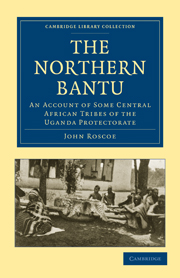Book contents
- Frontmatter
- PREFACE
- Contents
- LIST OF ILLUSTRATIONS
- Uganda and British East Africa
- PART I THE BANYORO A PASTORAL PEOPLE
- CHAP. I THE COUNTRY, THE PEOPLE, THE KING
- CHAP. II GOVERNMENT
- CHAP. III CLANS, TOTEMS AND TERMS OF RELATIONSHIP
- CHAP. IV MARRIAGE AND BIRTH
- CHAP. V SICKNESS AND DEATH
- CHAP. VI INDUSTRIES
- CHAP. VII WARFARE
- CHAP. VIII HUNTING, DRUMS AND THEIR USE
- CHAP. IX RELIGIOUS BELIEFS
- PART II THE BANYANKOLE A PASTORAL TRIBE OF ANKOLE
- PART III THE BAKENE, LAKE DWELLERS
- PART IV THE BAGESU A CANNIBAL TRIBE
- PART V THE BASOGA
- PART VI NILOTIC TRIBES. THE BATESO AND THE KAVIRONDO
- INDEX
- PUBLICATIONS OF THE CAMBRIDGE UNIVERSITY PRESS RELATING TO AFRICA
- Plate section
CHAP. III - CLANS, TOTEMS AND TERMS OF RELATIONSHIP
Published online by Cambridge University Press: 07 September 2011
- Frontmatter
- PREFACE
- Contents
- LIST OF ILLUSTRATIONS
- Uganda and British East Africa
- PART I THE BANYORO A PASTORAL PEOPLE
- CHAP. I THE COUNTRY, THE PEOPLE, THE KING
- CHAP. II GOVERNMENT
- CHAP. III CLANS, TOTEMS AND TERMS OF RELATIONSHIP
- CHAP. IV MARRIAGE AND BIRTH
- CHAP. V SICKNESS AND DEATH
- CHAP. VI INDUSTRIES
- CHAP. VII WARFARE
- CHAP. VIII HUNTING, DRUMS AND THEIR USE
- CHAP. IX RELIGIOUS BELIEFS
- PART II THE BANYANKOLE A PASTORAL TRIBE OF ANKOLE
- PART III THE BAKENE, LAKE DWELLERS
- PART IV THE BAGESU A CANNIBAL TRIBE
- PART V THE BASOGA
- PART VI NILOTIC TRIBES. THE BATESO AND THE KAVIRONDO
- INDEX
- PUBLICATIONS OF THE CAMBRIDGE UNIVERSITY PRESS RELATING TO AFRICA
- Plate section
Summary
Different classes in the tribe. There are two distinct classes of people in Bunyoro, with an intermediate class, drawn from the other two, whose members are free to marry into either the one or the other. The most important class is entirely pastoral, the members of it forming the aristocracy of the country. The other class is purely agricultural, and its members consist of the peasants and labouring people. The intermediate class is composed of men who devote themselves to the cultivation of land, but who also possess cattle and whose diet is partly vegetable and partly milk. They are possibly, in many cases, men who once belonged to the pastoral people but for some reason or other have taken to agriculture. Others may be peasants who, having become rich, have imitated the mode of life of the pastoral people and adopted a partial milk diet. Whatever their origin, they possess herds of cattle and some of their totems are cattle, while others are vegetable or plant totems; whereas purely pastoral people have totems relating almost entirely to cattle, and peasants who till the soil have totems taken from plants or things relating to agriculture.
Totem clans. All three classes of the Banyoro are respectively divided into a number of totem clans. No man is allowed to marry or have sexual intercourse with a woman of his own clan, and children belong to the clan of their father; in other words, the clans are exogamous with descent in the male line.
- Type
- Chapter
- Information
- The Northern BantuAn Account of Some Central African Tribes of the Uganda Protectorate, pp. 27 - 35Publisher: Cambridge University PressPrint publication year: 2010First published in: 1915



